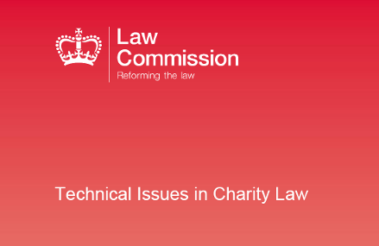It would have been easy enough to overlook the government’s response to the Law Commission, which was published earlier this week.
It came out in a busy week full of news: reports criticising ministers, charity services being abandoned, high-profile resignations.
Oh, and the original Commission report came out in 2017 – we can be forgiven for forgetting about it while waiting three and half years for a ministerial response.
But we do now have that reaction. And it tells us a surprising amount about how government views the charity sector right now.
Tweaks
To recap quickly.
The government has accepted lots of small tweaks which will make life a little bit easier for trustees.
Boards at big charities with permanent endowments will have greater freedoms about how they borrow against and invest that endowment, for example, and won’t have so much bureaucracy to wade through if they want to make ex-gratia payments to show goodwill (when, for example, a charity gets a big donation through a disputed will).
One change in particular will help small charities.
The government agreed that charities should be able to keep money when fundraising campaigns either exceed or fall short of their target.
Trustees used to have to check back with donors before keeping small donations. Now they can put donations of under £120 straight towards the charity’s mission, without any bureaucracy.
The government said this struck “a fair balance” between protecting donors and making sure charities could do good work. They are right. It means charities can fundraise with more confidence that, even if a given campaign never quite ignites the public imagination, the cash coming in will eventually go to a good cause.
Good news for the Charity Commission
Maybe the biggest winner, though, was the Charity Commission.
This is where the government response was rather less generous, and pulled up the drawbridge against reform.
The Law Commission argued for a review of how charities could appeal against the regulator’s decisions. The government rejected that.
And it said that charities should be able to appeal directly to the courts for the right to bring proceedings during disputes, over the regulator’s head. The government rejected that, too. Indeed, it explicitly backed the Charity Commission’s ability to manage any conflict of interests in the event that proceedings were brought in cases involving the regulator, saying it could introduce “robust information barriers”, whatever that means.
So the overall losers from the whole process may be people who have a gripe with the Charity Commission – and there are a few of them out there – who now won’t have any new avenues to make their concerns heard.
The Big Politics
This probably should not come as much of a surprise.
Looking at the bigger picture, the government response aligns rather neatly with Whitehall’s strategy towards the sector, going all the way back to the coalition government.
The fight around the gagging clauses in some public funding drew a clear distinction between what charities could do with cash raised from the public and what government was willing to fund charities to do.
Similarly, here government shows relatively little interest in trying to micro-manage the charity sector’s own money.
It is happy to remove some (admittedly quite easy-to-remove) red tape, so that the regulator is not bothered over relatively small sums of cash, leaving trustee boards to make sensible decisions in peace.
But the regulator’s control has been strengthened.
The government has declared its faith in the Charity Commission to act as a referee even in disputes where they are directly involved, and poured cold water on the idea that there could be new routes to appeal against decisions charities don’t agree with.
This is part of wider moves by the government, as well.
The Charity Commission has become a commentator on – and sometimes a participant in – various bits of a wider culture war which ministers have done little to discourage. An emboldened regulator suits this agenda rather well, so it is little wonder, perhaps, that the government has taken this chance to give the Charity Commission some public backing.
Dim and distant future
Even so, no one should hold their breath for these proposals to become law.
Plenty require passing secondary legislation, which means they will need parliamentary time. “We will look to implement this in due course”, promised the charity minister in a tweet, which is a very open-ended commitment, given the government’s approach in recent years to getting business through the House of Commons.
It is highly likely these reforms will stack up behind other enterprises which need parliamentary time.
This includes legislation required to release an estimated £800m in dormant assets to charities, a much bigger commitment which is itself subject to a vague timetable.
We may well ask when the Law Commission’s recommendations are going to become law. Three and a half years after the Commission’s report, and a week after the government finally responded, we still have no idea.
Related articles











